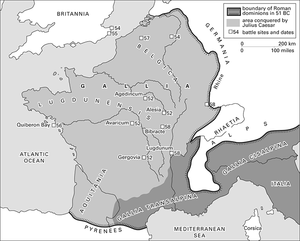Julius Caesar’s campaigns (58–51 bc), which established Roman rule over central and northern Europe west of the River Rhine (Gaul) (see map p. 237). Crossing into Transalpine Gaul, Caesar repelled German tribes in the south and east, Belgae in the north, and Veneti in the west. He even crossed the Rhine to demonstrate Roman control of that crucial natural frontier. With speed and ruthlessness and helped by inter-tribal disunity he subdued the northern and western coasts. He twice (55 and 54 bc) invaded Britain, which was regarded as a Belgic refuge and threat to Rome. In the winter of 53–52 bc, Vercingetorix rallied the central Gallic tribes in unusual unity. In a long and bitter war, Caesar defeated him and his successors, and he was executed. Caesar’s war dispatches, De Bello Gallico, supply most of the information about these events.

Gallic Wars. (58–51 bc) Julius Caesar was governor of Cisalpine Gaul when he embarked on the Gallic wars in 58 bc. His victory over the Helvetti at Bibracte was the first in a series of conquests in successive campaigning seasons. The Nervii, most powerful of the Belgic tribes, were defeated in 57, and a revolt by the Veneti was put down at Quiberon Bay in 56. These earlier victories were a tribute to the superior organization and generalship, but Caesar faced his greatest test in 52, when the Gauls united under Vercingetorix. The rebellion was broken by the siege of Alesia and Gaul was subsequently organized as a Roman province.
- two-way linked list
- two-way merge
- two-way non-coherent mode
- two-way table
- two-way travel time
- Two Wide-angle Imaging Neutral-atom Spectrometers
- two-wire circuit
- two’s complement
- two’s-complement notation
- TWT
- tychism
- Tycho
- Tycho Brahe
- Tycho Catalogue
- Tychonic system
- Tychonoff space
- Tychonoff’s theorem
- Tycho’s Star
- Tyler, John (1790–1862)
- Tyler, Wat (1381)
- tylose
- tympanic bone
- tympanic cavity
- tympanum
- Tyndale, William (1494–1536)